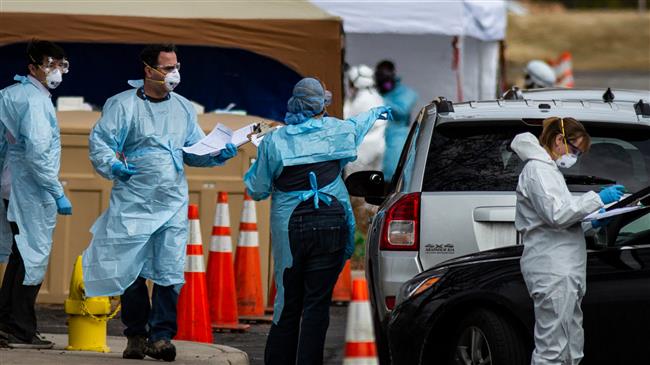
People are tested for the coronavirus at a drive-through clinic in Denver, Colorado. In some places, there arenít enough tests available, March 12, 2020. Chet Strange for The New York Times
Red tape, together with insufficient medical supplies has caused the United States to fall behind on coronavirus testing, the New York Post and CNBC said.
An article published by the New York Post blamed the US Centers for Disease Control and Prevention (CDC) for underestimating the threat of the pandemic and slowing the early response to the deadly disease.
The Post said red tape has crippled Americaís coronavirus response as US governors and city officials pleading got ventilators and personal protective equipment for frontline medical workers.
Only this week, the US Food and Drug Administration waived some restrictions on the production and sale of surgical masks - more than two months after the first coronavirus case in the United States was confirmed, in Washington state on January 20.
Itís the latest example of red tape gone awry that could prove deadly, the New York Post said. It took weeks for the feds to waive regulations even on coronavirus testing kits. For more than a month, the CDC only allowed the use of its test - which proved to be inaccurate much of the time - even as companies were eagerly waiting to produce better and faster kits.
The Post noted that US bureaucrats assume they can only get in trouble for allowing something that later produces problems, rather than for stopping something that was actually fine.
The NY daily referred to "long list of red tape in the US", saying that before a state of emergency was declared in New York, which is now the epicenter of the American coronavirus outbreak, doctors, nurses, nurse practitioners and physiciansí assistants who were licensed in another state, but not New York, had not been allowed to jump in to help.
Also US manufacturers of N95 respirator masks now faces very time-consuming procedure - special tests of flammability and strength, for example - because such masks classified as medical devices.
This, as US hospitals face shortage of personal protective equipment, including masks, amid deepening coronavirus crisis across the country.
A report from CNBC said that the technology of testing, which is critical to identify and trace the potential contacts of the virus, is rudimentary, pointing out that the primary reason for the testing bottleneck in the US is the red tape.
In the beginning of the outbreak, the US Centers for Disease Control and Prevention sent out test kits to public labs, but some kits were found to have quality issues. The checking and re-disbursing kits led to delays, Reuters said.
For a long time, the CDC has very strict standards for who is eligible for the test, which is widely blamed for limiting the ability to track the spread of the disease.
The CDCís guidelines had said only people who had fever or symptoms with cough or shortness of breath and had close contact with a confirmed COVID-19 patient could receive the test.
Only at the end of February, the CDC relaxed the rules on who is qualified for testing, however even today it is still unclear about who can get the test and who cannot.
"It is a local policy decision. Different medical systems have different policies," said Dr. Alex Greninger, the assistant director of the University of Washington.
The NY Post says Americans have always known that red tape kills jobs. Now they are learning that it can kill people, too.
The United States has the most confirmed cases globally at over 160,700. More than 3,000 people have died in the US as of early Tuesday morning. More than 1,200 people have died in New York State.
With the situation in the US getting worse, the countryís Centers for Disease Control and Prevention is facing heavy criticism from the public, Reuters said.
Even as the US is trying to increase testing capacity, it is facing a huge challenge in the form of lacking basic supplies to conduct the novel coronavirus tests.
According to the CNBC, the swabs, pipettes and reagents are running low in many states in the country.
The CDC announced this week a domestic travel advisory and urged residents across the US to refrain from non-essential domestic travel for 14 days. But some said the decision comes "four weeks late."
SOURCE: PRESS TV
LINK: https://www.ansarpress.com/english/15210
TAGS:






























 online news tv
online news tv




